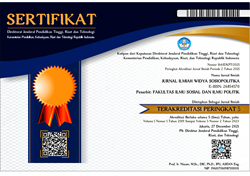Publication Ethic
The journal is committed to upholding the highest standards of publication ethics and takes all possible measures against any publication malpractice. Authors, editors, reviewers, and publishers are expected to follow ethical guidelines at all stages of the publication process.
Authors’ Responsibilities
-
Submit original works that have not been published elsewhere and are not under consideration in any other journal.
-
Properly cite and acknowledge the work of others.
-
Avoid plagiarism, data fabrication, and falsification.
-
Ensure that all listed authors have significantly contributed to the research and agree with the final manuscript.
-
Disclose any financial or other conflicts of interest that may influence the research.
Editors’ Responsibilities
-
Make publication decisions based solely on the quality, originality, and relevance of the manuscript.
-
Ensure a fair and unbiased review process, maintaining confidentiality of submissions.
-
Prevent conflicts of interest by refraining from using unpublished materials for personal benefit.
-
Take appropriate action when ethical complaints are raised regarding a submitted or published paper.
Reviewers’ Responsibilities
-
Provide objective, constructive, and timely feedback to assist authors in improving their work.
-
Maintain confidentiality of the manuscript and not use the information for personal advantage.
-
Disclose any potential conflicts of interest with respect to the research, authors, or institutions.
Publisher’s Responsibilities
-
Ensure that good practices are maintained to support ethical conduct in scholarly publishing.
-
Cooperate with editors in cases of suspected ethical misconduct, including plagiarism and fraudulent publication.
By adhering to these principles, the journal seeks to foster an environment of integrity, transparency, and academic excellence in the dissemination of scholarly knowledge.




